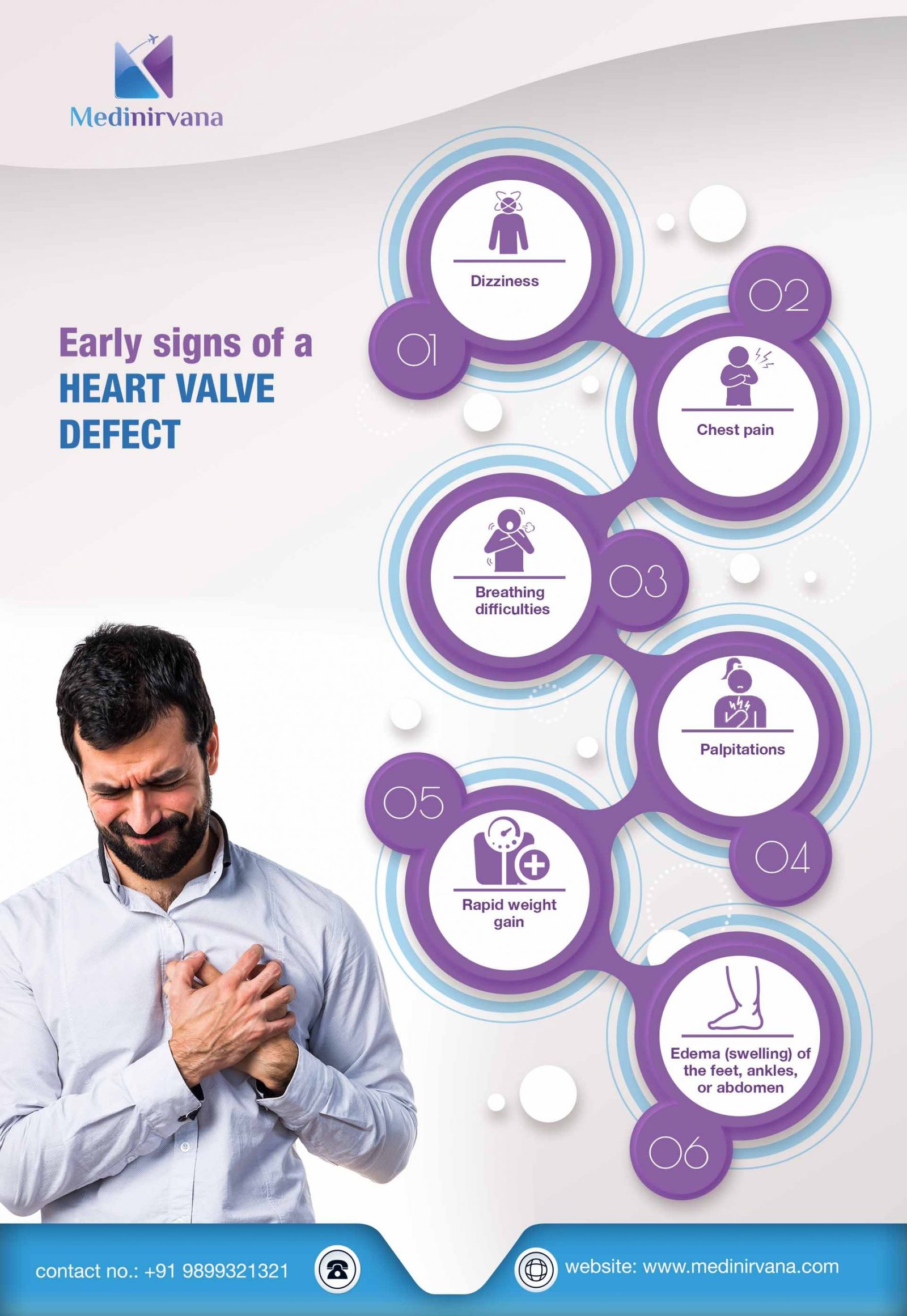According to the WHO statistics, cardiovascular ailments account for over 17.9 million deaths each year globally. Heart valve collapse or rupture leads to 2-3% of the individuals struggling with heart diseases.
Given how crucial heart valves are for healthy blood circulation in the body, treating them immediately is crucial. India serves as a leading center of treatment for such conditions because of the experienced team of doctors, well-equipped hospitals, and several other factors.
If you have been diagnosed with your heart valves and need immediate replacement surgery, India is the country you need to fly out to.
Table of Contents
Feel free to skip ahead if one topic catches your eye:
- Types of Heart Valve Replacement Surgery in India
- Preparing for Heart Valve Surgery in India
- How is it done?
- Cost of Heart Valve Replacement in India
- Why should you prefer India for Heart Valve Replacement Surgery?
1. Types of Heart Valve Replacement Surgery in India
Generally, there are four different types of heart valve replacement surgeries that are conducted in India. Depending on your condition, the surgeon will suggest one of the following:
Aortic Valve Replacement – The aortic valve in our heart is responsible for allowing the outflow of the blood out of the left ventricle. The majority of the patients struggling with congenital heart defects need to undergo aortic valve replacement to prevent stenosis. If a patient struggles with bicuspid valve abnormality, they might need to undergo immediate valve replacement to avoid further threats to their health and well-being.
Mitral Valve Replacement – The second type of surgery involves replacing the mitral valve present on the heart’s left side. Patients with narrow or constricted mitral valves need to undergo surgeries to open up the valve for a smoother blood flow. It prevents the risks of raised blood pressure around the opening that, in turn, affects the lungs. The damaged valve is generally replaced with a biological valve or an artificial metal valve.
Double Valve Replacement – If a patient struggles with anomalies in both the aortic and the mitral valves in their heart, they need to undergo surgery to replace both of them. This is what double valve replacement surgery entails. It is very rare but has a higher success rate.
Pulmonary Valve Replacement – This is likely the most crucial valve replacement out of them all. The pulmonary valve works in tandem with the pulmonary artery for transferring blood back to the lungs for oxygenation. Any kind of inhibition in the blood flow due to stenosis that restricts the blood flow needs immediate attention.
-
Types of Valves used in the surgery
The surgeons use the two primary options – Mechanical Valves or Biological Valves. Each comes with its own set of pros and cons. The surgeon will likely suggest the best option that will support your heart health better.
Mechanical Valve – These are the metal valves shaped as a leaflet and are made from carbon and metal. These variants are often implanted in the younger patients as they have a longer tenure of 20-30 years.
Biological Valve – Also known as the bioprosthetic valves, these are the types of valves extracted from cows and pigs. They are primarily fitted in the older patients as they last for 10-15 years and require the patient to undergo another surgery to replace that.
2. Preparing for Heart Valve Surgery in India
For your planned heart valve replacement surgery in India, there are quite a few factors that you need to keep a check on.
-
Make a checklist of the documents.
As a medical tourist, you need to have all your documents sorted before and after coming to India. These documents are necessary for getting your medical visa initially and necessary for correspondence once you reach India. Some of the required documents include:
- Hospital letter (where you will undergo the treatment)
- Scanned copy of the passport (of both the patient and attendant)
- Photograph
- Address proof (of both the patient and attendant)
- Recommendation letter from the diagnosing doctor in your country
- e-Medical visa
- Previous medical reports
- Proof of health insurance or required funds for the treatment
-
Prepare yourself physically and mentally.
Undergoing any surgery does take a toll on your physical and mental health. So, gearing up for the procedure days in advance is essential. This gives you a chance to self-reflect and does things the right way to ensure a successful surgery in the end. Following are a few of the tips that can help tide you through the process:
- Switch to a healthy diet and build up your immunity
- Be optimistic about the results
- Have realistic expectations about the procedure
- Prepare your mind for the surgery
- Follow the necessary instructions as suggested by the doctor
- Avoid smoking or drinking before the surgery
In India, you are assured of the absolute best treatment involving a team of skilled doctors and highly qualified professionals in an advanced hospital setting.
3. How is it done?
Heart valve replacement is an extensive and complicated process that is done under general anesthesia. It is generally either done the conventional way by making an incision from the neck down to the navel or via an advanced minimally invasive procedure by making a much smaller incision.
Once the incision is done, the surgeon removes the damaged valve and replaces it with a healthy valve. The valves are generally removed via the aorta by making incisions in it. The patient also needs to have bypass support to keep the blood pumping through the heart and lungs to keep your body functions, usually during the surgery.
Once the incision is done, the surgeon removes the damaged valve and replaces it with a healthy valve. The valves are generally removed via the aorta by making incisions in it. The patient also needs to have bypass support to keep the blood pumping through the heart and lungs to keep your body functions, usually during the surgery.
There are some important points that the patients need to take care of before and after the surgery.
-
Pre-surgical care
- Detailed consultation with the surgeon about the treatment plan
- Tests and imaging to get a recent picture of the condition
- Avoid smoking and alcohol before the surgery
- Stop taking any medications, as instructed by the doctor
- Proper diet before the surgery
Post-surgical care
- Incision care
- Avoid indulging in strenuous work or heavy-lifting
- Hospital stay (if needed)
- Taking prescribed pain relievers and antibiotics on time
- Resting to ensure faster and better healing
-
Recovery timeline
The recovery timeline after a heart valve replacement is variable and subjective to the patient’s body.
-
In the Hospital
Generally, the patient does need to stay in the hospital for up to a week after the surgery for observation and to monitor any post-op complications. If the surgery was done via minimally invasive procedures, the hospital stay might be less.
The medical staff generally monitors the vitals, conducts tests, and even keeps an eye out for infections. In case the patient witnesses any unnecessary changes in the incision, the same is addressed by the surgeon immediately to prevent any further risks.
-
At Home
Once the patient is discharged from the hospital after the initial recovery, they are taken into home care for the rest of the recovery. At home, the patient needs to abide by the surgeon’s instructions, both in terms of activities and their diet.
Generally, the patient is advised with a normal diet, keeping the salt and spice intake in check. As for the activities, any form of rigorous activities and heavy-lifting is strictly prohibited for at least 4-6 weeks after the surgery.
Additionally, the patient needs to get optimal sleep to let the body heal faster. If your incision was made along the breastbone, the surgeon advises sleeping on your back till the incision heals completely.
4. Cost of Heart Valve Replacement in India
The cost of heart valve replacement is variable and depends on the number of valves that need replacing, along with your heart condition and overall health. The rates generally start from INR 3,00,000 and can exceed depending on the state of the patient.
Some of the factors that influence the cost of the surgery include:
- Hospital in which the surgery is done
- Number of valves that need to be replaced
- Charges of the surgeon
- Complexity of the case
Compared to the leading Western countries globally, India offers one of the most cost-effective treatment options with a higher success rate.
5. Why should you prefer India for Heart Valve Replacement Surgery?
Apart from the fact that India has a very systematic way of treatment at economical costs, there are quite a few other factors that pose the country as a leading option for heart valve replacement surgery.
Some of the most important ones are:
- India has a host of skilled, qualified, and highly experienced cardiologists and cardiac surgeons
- It offers advanced technologies in the hospitals; all at extremely affordable costs
- The medical staff in the hospital are highly qualified and are trained to operate all the available medical infrastructure
- Hospitals provide round the clock care, along with healthy and nutritious meals to the patients for faster recovery
- Ease in acquiring a medical visa (popular medical tourism companies can make the process even more comfortable)
- Hospitals are careful about following all the Covid-19 safety guidelines
- Hospital staff and medical professionals, including the surgeons, are incredibly thoughtful about patient confidentiality
- Ease of communication with minimal to no language barrier
- 98% success rate in the treatments and surgeries
At Medinirvana, all you have to do is provide the team with the necessary information and reports, and they take care of everything else for you. From arranging the best hospital to follow-ups and accommodation, the team takes care of everything.
Take Away
Heart Valve Replacement Surgery is a complicated and critical procedure that should always be done under an experienced medical professional’s guidance. India is one of the leading countries in cardiac treatment and care. Other thanC higher success rate and faster recovery, the patients can also save up a lot more money than the other countries offering the same treatment options.










Leave a Reply